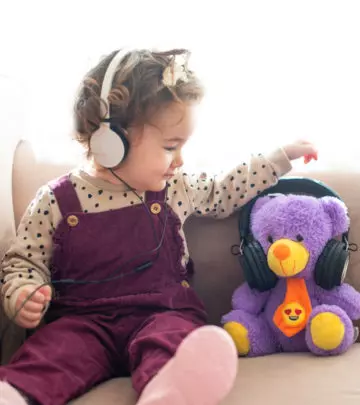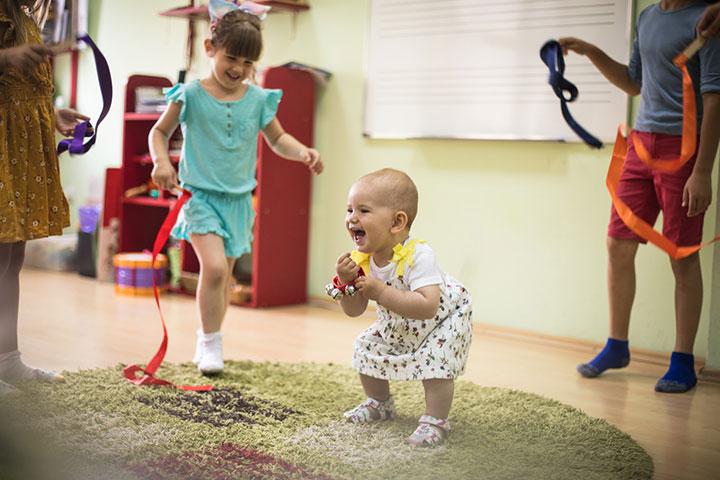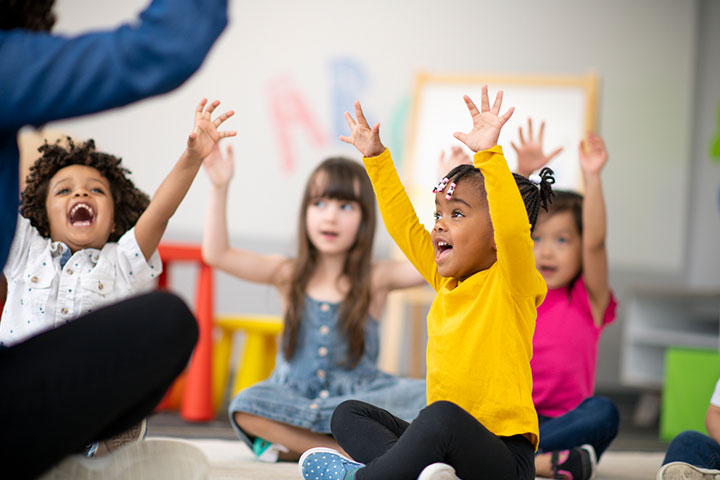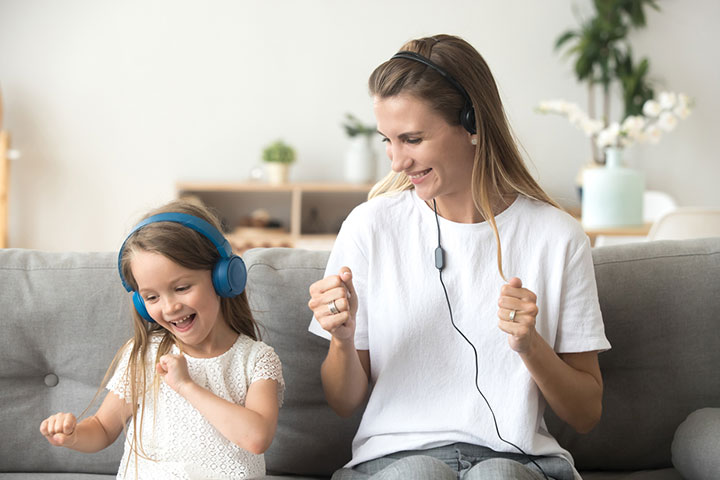
Image: iStock
From grandparents to infants, everyone loves music. As people, we love to listen to different rhythms, bob our heads to the music, dance and sing along as best as we can. It brings us joy to listen to music that echoes our own emotions. But did you know that listening to music can do wonders for your little one’s development? Who would have thought that! Irrespective of if your child jams out to your carefully curated 90’s playlist, the soundtrack to Disney’s latest movie, or good old nursery rhymes, music can help boost their self confidence, motor skills and even language skills. If you’d like to know just how beneficial it is for your little ones to listen to music on a regular basis, then this is the article for you. Read on to know more about the developmental benefits of music!
1. Improves Fine And Large Motor Skills
Listening to music can benefit even a little baby trying to get a grasp of their fine and large motor skills. Think about it, when kids hear their favorite song or an interesting tune, they can’t help but bop to it and dance around. Even if your little one is too young to move about freely, they’ll wiggle around and try to sing along. These simple and easy movements and activities may not draw much notice from you. But these are the building blocks towards better motor function in the future (1). Not to mention that it also improves mobility skills like jumping and bending the body. And this is mainly because dancing and moving about helps increase a child’s muscle development and strengthens their bones. So music can actually influence your child’s mobility and strength!
2. Builds Close Relationships
If there’s one thing we do know, it’s that music has the ability to bring people closer together. That’s why it is such an integral part of movies, important memories and everyday life. Music helps people connect with each other on a deeper level. And this can be true of kids as well. By engaging in singing, dancing and other activities involving music, they start to steadily build their communication skills as well as their responsiveness. This can also help them cement a lasting bond with their parents. Even taking a few minutes a day to sing and dance with your little ones will help them create lasting memories with you that they will cherish for the rest of their lives.
Taking up singing and dancing as a hobby will also ensure that your child has another community to interact with and fall back on. They can work on their communication skills by interacting with people of all age groups and learn to be responsive to advice, criticism and praise.
3. Develop Language Skills
Do you ever wonder how you can’t remember what you had for breakfast but can remember every single lyric to all your favorite songs from when you were 5? That’s probably because those songs aided you in learning the language itself. Think about it, all song lyrics are rooted in language (2). While fun and interesting rhythms and melodies help kids memorize these phrases. That’s why nursery rhymes are so successful when it comes to teaching kids the basics such as, the alphabets, animals, plants and even interesting facts about people. Nursery rhymes also have been shown to improve a child’s story telling skills and so (3), must be an integral part of early childhood education. This is also a great way to promote creativity and a wider vocabulary.
4. Improves Their Ability To Manage Their Emotions
Let’s be honest, we all use music as an outlet for our emotions. Be it sad, happy, anxious or contemplative, music helps calm us down, acknowledge our emotions and move on. And this can be true even for your little one. Music can be used to help your fidgety toddler calm down, but it can also be used as a mood booster and a way to lift their spirits up. Teaching kids to utilize music in order to help them control their emotions is an important part of childhood development. Not only will these kids learn to appreciate music and use it as a tool to soothe themselves, but they will reach for it when they need comfort. You can start with something a little one the nose like “if you’re happy and you know it clap your hands”, and then allow them to gravitate towards songs that they are naturally drawn to.
Music in so many ways mimics life and helps us hope with stressful situations. But it can also benefit your baby in other ways. So why not play their favorite tunes and let them bop to the rhythm?
Sources:
- The Influence Of Educational Dance On The Motor Development Of Children, NCBI
- Born to Speak and Sing: Musical Predictors of Language Development in Pre-schoolers, NCBI
- Effects of ASL Rhyme and Rhythm on Deaf Children’s Engagement Behavior and Accuracy in Recitation: Evidence from a Single Case Design, NCBI
















